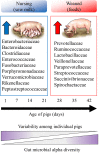Piglet gut microbial shifts early in life: causes and effects
- PMID: 30651985
- PMCID: PMC6330741
- DOI: 10.1186/s40104-018-0308-3
Piglet gut microbial shifts early in life: causes and effects
Abstract
The gut microbiome has long been known to play fundamentally important roles in the animal health and the well-being of its host. As such, the establishment and maintenance of a beneficial gut microbiota early in life is crucial in pigs, since early gut colonizers are pivotal in the establishment of permanent microbial community structures affecting the health and growth performance of pigs later in life. Emphasizing this importance of early gut colonizers, it is critical to understand the factors impacting the establishment of the piglet gut microbiome at weaning. Factors include, among others, diet, in-feed antibiotics, probiotics and prebiotic administration. The impact of these factors on establishment of the gut microbiome of piglets at weaning includes effects on piglet gut microbial diversity, structure, and succession. In this review, we thoroughly reviewed the most recent findings on the piglet gut microbiome shifts as influenced by weaning, and how these microbiome changes brought about by various factors that have been shown to affect the development of microbiota in piglets. This review will provide a general overview of recent studies that can help to facilitate the design of new strategies to modulate the gut microbiome in order to enhance gastrointestinal health, growth performance and well-being of piglets.
Keywords: 16S rRNA; Microbial diversity; Next generation sequencing; Swine microbiota; Weaning.
Conflict of interest statement
Not applicable.Not applicable.The authors declare that they have no competing interests.
Figures



References
Publication types
LinkOut - more resources
Full Text Sources
Other Literature Sources
Molecular Biology Databases
Research Materials

